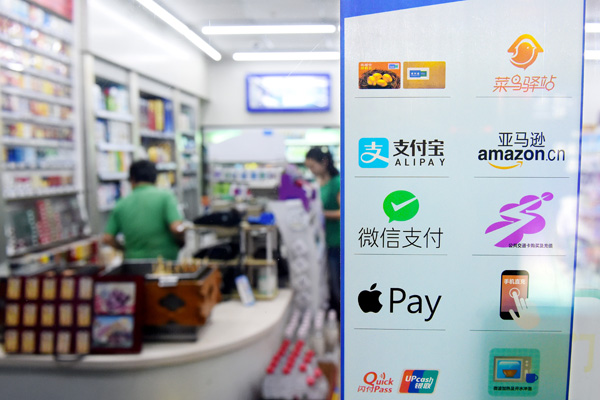 |
|
A billboard displaying various kinds of supported mobile payments is pictured in a convenience store in Shanghai, on May 31, 2016. [Photo/VCG] |
Chinese third-party payment platform WeChat Pay's mobile payment campaign reached its climax today, dubbed "No Cash Day" by the platform since last year.
From August 1-7, every day's first payment by WeChat Pay's users to any offline store, with the sign of No Cash Day, could have gotten them a random monetary reward up to 888 yuan ($133).
On August 8, when users use WeChat Pay to make payments, they can spend the accumulated money rewarded to them over the previous seven days. In addition, they have the opportunity to get a direct discount on payments.
Meanwhile, WeChat Pay's rival Alipay, the third-party payment platform of Alibaba Group Holding Ltd, plans to spend 100 million yuan on rewarding its users.
From July 20 to October 31, Alipay's users can receive a direct discount of less than 999 yuan every time they use Alipay to make payments to offline stores. All Alipay users can check the real-time balance of the original 100 million yuan on the home page of Alipay.
Both of the offline mobile payments promotion campaigns by WeChat Pay and Alipay were launched last year. The number of offline stores cooperating with WeChat Pay in the "No Cash Day" campaign has increased from 80,000 last year to 700,000 this year.
China's third-party mobile payment market scale reached 5.97 trillion yuan in the first quarter (Q1) of 2016, having a year-on-year increase of 111 percent, according to a report by Chinese research firm Analysys.
Analysys still crowned Alipay as leading the mobile payment market, occupying 63.41 percent of the market share in Q1 this year, while Tencent Holdings Ltd's Tenpay ranked second with 23.03 percent of the market share.
As an in-app payment feature of Tencent's WeChat, a messaging and social networking app, WeChat Pay was launched by both WeChat and Tenpay in August, 2013. It contributed 84 percent of Tenpay's mobile payment market share in Q1 this year.
Although it was Alipay which first launched the mobile payment function in China in 2012, the generalization of no cash payments was originally boosted by WeChat Pay, according to a report by donews.com.
During the Spring Festival of 2013, WeChat Pay successfully used the Chinese tradition of sending red envelopes containing money as blessings to promote mobile payment to the masses.??
The post-90 generation, and workplace freshmen aged between 23 to 29 years, are the main force driving mobile payment in China, according to a report by Ipsos Group Co, a Paris-based market research group.
Accustomed to living without cash, 12 percent of respondents who were university students, said they often went out with no cash, while 35 percent of young while-collar workers said they often went out with a maximum 100 yuan in cash.
Ipsos said China's third-party mobile payment market reached ten trillion yuan in 2015.
